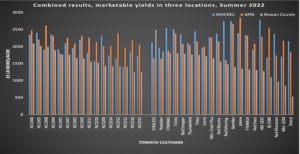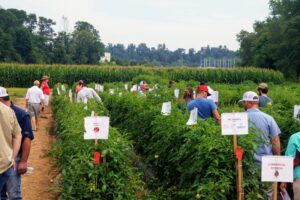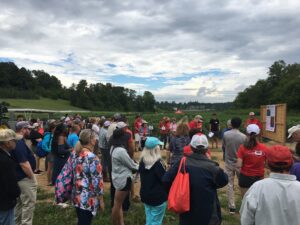Final report for OS21-141
Project Information
We propose that the critical solution to mitigate VW damage may be host resistance, and on-farm trials in Vd2 infested fields are the key component of the efforts to successfully identify new sources of VW resistance tomato germplasm.
Conventional breeding for race 2 VW resistance has been difficult due to the lack of novel genetic sources with durable resistance against V. dahliae non-race 1 strains; furthermore, complex genetic control and pathogen’s heterogeneous population have impeded the efforts to identify any tomato genotypes with consistent resistance to non-race 1 isolates of the pathogen. In an effort to find a single strong resistance gene, researchers have used an aggressive disease screening technique, seedling root-dip test, over the years for VW resistance evaluation, resulting in the inoculation test being too severe to identify moderate horizontal resistance levels. Furthermore, this method can be affected by external factors, such as method of inoculation, inoculum concentration and age, and disturbance of the roots, therefore, appear to influence the eventual fate of tomato plants infected at different growth stages (Visser and Hattingh, 1981). Based on the above, the use of the seedling root dip screen may not be a way to identify potentially useful horizontal resistance that may not be present in the young seedlings at a level strong enough to withstand this extreme screening technique. Therefore, other techniques for screening as proposed in this project may be needed to identify useful resistance to multiple strains of the fungus, if that does exist.
In recent years, Dr. Randy Gardner, Professor Emeritus at NC State, has identified two sources of useful, moderate resistance to verticillium wilt that have held up in WNC grower fields with high disease incidences over the last six years. The Vd2 resistant breeding lines, designated as ‘NC 6GEM’ and ‘NC 7GEM’, are derived from self-pollinated ‘Mountain Fresh Plus’ and the wild tomato line, ‘Hawaii 7998’, respectively. Mountain Fresh Plus is the F1 hybrid of NC 84173 crossed with NC 109. In replicated grower field trials with and without fumigation, NC 109, but not NC 84173, showed similar resistance against Vd2, and we assume that the moderate resistance in NC 6GEM originated from NC 109. We believe investigation of the genetic background of these resistant breeding lines will be one of the most important contributions to gain deeper insights into the genetic foundation of Vd2 resistance in tomatoes and develop new resistant tomato germplasm.
On-farm trials will also help us to evaluate and develop new material derived from VW resistant parental lines (‘NC 109’, ‘NC 6GEM’, and ‘NC 7GEM’) with improved horticultural characteristics and additional disease resistances.
Funding from this proposal will be used to perform two replicated on-farm trials in Henderson and Haywood Counties, NC in Vd2 infested fields with no fumigation. A randomized complete block design (RCBD) with two blocks and four-plant plots will be used to evaluate 500 tomato genotypes in two different locations in the summer of 2021 and 2022. VW incident and severity will be evaluated based on Horsfall-Barratt ratings and recorded (Horsfall and Barratt, 1945). A five-scale subjective rating system will be used to evaluate horticultural performances of the lines including fruit set (yield), size, and shape as well as earliness and fruit’s internal and external color. To identify the most resistant lines with the best horticultural characteristics, all data will be subjected to analysis of variance. We will employ the linear mixed-model (MIXED) procedure of SAS software (version 9.2; SAS Institute Inc., Cary, NC) to perform the analysis of variance based on the RCBD with 4 replications (2 reps per location). The list below gives a breakdown of the key objectives and descriptions of the samples included in the on-farm trials.
1- Confirming VW resistance in new fresh market tomato breeding lines and hybrids. To increase the durability of the resistance to non-race 1 isolates, Dr. Randy Gardner crossed ‘NC 7GEM’ and ‘NC 6GEM’ to combine VW resistance from different parental sources. Interestingly, the F2 population was segregating for resistance confirming the differences in the genetic structures of the resistance sources in the two resistant breeding lines. To improve the horticultural performances, he also crossed ‘NC 6GEM’ to ‘NC 9BS’, a susceptible breeding line with more horticulturally desirable traits. He selected the most resistant 31 F2 individuals and advanced them to F6 progeny to be used in new testcrosses and hybrid development. New hybrids are being developed from testcrosses in fall 2020 and spring 2021. Funding from this proposal will be used to test those lines and hybrids to confirm their Vd2 resistance and evaluate horticultural performances in the on-farm trials.
2- Advancing and evaluating two mapping populations for future DNA marker development and Vd2 resistant gene/s Discovery. In an effort to develop mapping populations for novel Vd2 resistant gene/s discovery, we grew 215 new F2 plants from the cross, (NC 7GEM x NC 6GEM), and evaluated the VW disease incidence and severity under field conditions in summer 2019 and 2020. A five-scale disease severity index (DSI) was used to evaluate verticillium resistance in this study. All 215 F2 individuals were advanced to F4 generation by the single seed descent method. We applied the same scheme to develop a second mapping population with 214 individuals from a cross between ‘NC 6GEM’ and a susceptible breeding line, ‘NC 9BS’. The field evaluation was conducted under natural VW pressure and disease severity index (DSI) was assigned subjectively to individual F2 and F3 plants in summer 2019 and 2020, respectively. Segregation ratios of DSIs were very close to a 1:2:1 ratio in both populations, about 25% of the F3 progenies showed resistance equal or better than both resistant parents (DSI=1), 25% were highly susceptible (DSI=4-5), and 50% showed moderate tolerance (DSI=2-3). Considering phenotypes of the 3 parental lines, resistant (‘NC 6GEM’ and ‘NC 7GEM’) and susceptible (‘NC 9BS’), and the observed segregation ratios, presence of a single dominant or semi-dominant gene in the resistant parental lines ‘NC 6GEM’ and ‘NC 7GEM’ is possible, but replicated and comprehensive experiments will be necessary to confirm the phenotypes of the advanced progenies under field conditions for genetic mapping. In summer 2021, 429 F4 recombinant inbred lines (RILs) from the two populations will be included in the replicated on-farm trials for VW disease incidence and severity evaluation. All F4 individuals will be advanced to F5 generation by the single seed descent method. The phenotypic data will be confirmed again by using progenies at F5 generation, and tissues will be collected for gene fine mapping and expression profiling. Fine mapping and expression profiling of the samples to develop DNA markers and identify the Vd2 resistant gene/s will be beyond this project and other sources of enteral and external funding will be secured to do the work. However, the most tolerant recombinant inbred lines (RILs) in the populations with potential horticultural performances will be identified and used in new testcrosses and hybrid development in the fall of 2022.
3- Confirming Vd2 resistance in NCSU tomato breeding lines and hybrids.
In summer 2019, three on-farm trials in verticillium-infested grower fields, two non-fumigated and one fumigated, revealed additional NCSU breeding lines and commercial tomato hybrids with moderate tolerance to verticillium. Of 160 fresh market tomato breeding lines and F1 hybrids tested, only six breeding lines from NCSU and nine F1 hybrids showed moderate tolerance (DSI≤3) to verticillium infection consistently through all three trials. Sixty fresh market tomato breeding lines from NCSU (developed from 1987 to 2019), thirty-three breeding lines from the University of Florida (UF), and 71 new and commercial F1 hybrids from NCSU, UF, and private seed companies were tested and no strong source of VW resistance was identified (data not shown). To confirm the effectiveness, the identified lines with moderate resistance to VW will be included in the on-farm trials supported by funding for this proposal.
Cooperators
- (Researcher)
- - Producer
- (Researcher)
Research
There is heavy Verticillium infestation in numerous growers' fields in Henderson, Buncombe, and neighboring Counties in Western North Carolina. Performing on-farm trials in disease-infested fields is crucial to screen for and select disease-resistant germplasm. On the other hand, disease-resistant cultivars should also be evaluated for horticultural performance. On-farm collaboration with growers in the region has enabled the NCSU tomato breeding program to develop multiple elite tomato cultivars successfully.
We performed two field trials, one on-farm trial in a grower field and one research field trial at MHCRC. Both locations have a history of non-race 1 Verticillium wilt (VW) incidences. Non-replicated trials with four and two plants per plot were used to evaluate and advance the progenies of the two genetic mapping populations to F6 generations on an on-farm and research field trial respectively. A Single plant from each plot at MHCREC was selected and advanced to F6 generation.
We also performed two replicated trials with a collection of new F1 hybrids, the most resistant, and susceptible RILs to confirm their phenotype. Disease evaluation data from summer 2021 field trials were used to select 36 resistant and 16 susceptible RILs for the replicated field trials. There were also 10 new F1 hybrids included in the trails. On-farm trials in the summer of 2021 revealed new sources of VW resistance in old tomato accession. Of these 10 breeding lines were selected and test-crossed to a resistant NCSU tomato breeding line (NC 109) and resulting F1 hybrids were included in the replicated field trials. A randomized complete block design (RCBD) with two blocks and four-plant plots was used to perform the replicated trials in two different locations in the summer of 2022. VW incidents and severity were evaluated based on Horsfall-Barratt ratings and recorded (Horsfall and Barratt, 1945). A five-scale subjective rating system was used to evaluate the horticultural performances of the lines including fruit set (yield), size, and shape as well as earliness.
We performed three and two field trials in the summer of 2021 and 2022, respectively, using funding from the Southern SARE on-farm trial program.
1. Confirming VW resistance in new fresh market tomato breeding lines and hybrids
Eight and ten new F1 tomato hybrids (eighteen F1 hybrids total) with potential VW tolerance were developed and tested in two replicated trials in the summer of 2021 and 2022, respectively. Of which 6 hybrids showed promising horticultural performance based on subjective disease and performance evaluations. Moving forward these 6 hybrids will be included in our cultivar development pipelines in the summer of 2023 utilizing other funding sources. The marketable yield of these lines will be measured and graded in the summer of 2023 along with other commercial tomato cultivars. Some of these hybrids will be released for public use after confirming the yield and disease resistance in the summer of 2023.
2. Advancing and evaluating two mapping populations for future DNA marker development and Vd2 resistant gene/s Discovery
Around 560 recombinant inbred lines (RIL) from two mapping populations were screened for VW resistance in three locations and progenies were advanced to F6 generation (they were at F4 generation when this project started) by single plant selection. The disease screening data was crucial to secure funding from USDA_NIFA, AFRI, Plant Health and Production, and Plant Products: Plant Breeding for Agricultural Production program in 2022. The new funding will be used to complement this project and study the genetics behind the Vd2 resistance in NCSU tomato germplasm.
3. Confirming Vd2 resistance in NCSU tomato breeding lines and hybrids
At MHCREC in Mills River, NC, two replications (6 plants per plot) of thirty-six tomato varieties were transplanted on June 1, 2022. Ripe tomato fruits at the breaker to the fully ripe stage were harvested three times on August 15, 22, and 29 and graded by a Durand Wayland Packing machine. The number and weights of marketable and culled fruit were recorded. Yield per acre (25 lb boxes/acre) was calculated by assuming 4840 plants per acre with an in-row spacing of 18 inches on 6 ft. centers. Under the experimental field trials at MHCREC, we have identified 12 commercial and two new experimental round tomato hybrids (developed by utilizing this funding) with a marketable yield higher than 2,000 boxes (25lb) per acre, of which only one hybrid (HM1823) produced more than 2,500 boxes per acre. Four plum hybrids produced more than 2,000 boxes per acre of marketable tomatoes (Figure 1).
A single replication of the same tomato hybrids collection was planted in Mountain Research Station (MRS), Waynesville, NC on June 8, 2022. Mature-green fruits once-over harvested when around 70% of the fruits were ripe on September 14, 2021. The number and weights of marketable and cull fruit were recorded (Figure 1). Twelve new hybrids and 13 commercial cultivars had better performance with marketable yields higher than 2,000 boxes per acre.
In a grower’s field in Rowan County (China Grove, NC), an on-farm trial with the same tomato hybrids was conducted. Two replications of four-plant plots were transplanted on June 14, 2022. Mature-green fruits once-over harvested when around 50% of the fruits were ripe on August 15, 2022. Yield per acre (25 lb boxes/acre) was calculated by assuming 4840 plants per acre with an in-row spacing of 18 inches on 6 ft. centers. Significant reduction in yield due to common fruit defects (rough blossom scar, radial cracking, rain check, and catfacing) caused by environmental factors is one of the main challenges in commercial tomato production in Rowan County. In our trial, overall marketable yields were reduced in Rowan County due to higher rates of fruit defects and culls compared to trials in western North Carolina. Three new hybrids (NC1005, NC1006, and NC1008) and one commercial tomato hybrid (STM2255) produced more than 2,000 boxes of marketable tomatoes per acre (Figure 1).
Figure 1: Total marketable yields of 16 new NCSU tomato F1 hybrids (NC1001-NC1016) and 20 commercial fresh market tomatoes at three locations. The last sex lines are plum tomato types
Educational & Outreach Activities
Participation Summary:
Finding from objectives 1 and 3, as well as data from multilocational on-farm hybrid trials were shared with NC state tomato growers and stakeholders (about 270 people) at the 54th and 55th Annual Meeting and Winter Vegetable Conference and Trade Show in Asheville NC organized by the NC State tomato growers association in Feb 2022 and 2023. Stakeholders, Ag professionals, and NC state tomato growers (about 250 visitors) were also able to visit our field trial at MHCREC during Tomato Field Day (August 2021 and 2022) and this gave them an opportunity to compare and assess different commercial and experimental tomato cultivars in real-time. Other than 16 F1 tomato hybrids, we have developed 18 new F1 hybrids with VW resistance. These hybrids were evaluated subjectivity in the summer of 2021 and 2022. Of these 6 hybrids will be included in our commercial cultivar trials for yield measurements in the summer of 2023. New hybrids will be tested and presented to NC state tomato growers in the summer of 2023 during Tomato Field Trial (scheduled for August 10, 2023).
Learning Outcomes
We estimate about 10 tomato growers in western NC will be willing to test our new tomato hybrids, on a small scale, as soon as we release them for public use.
We also anticipate private tomato breeding companies began to utilize our VW-resistant breeding lines in their tomato breeding activities as soon as we are able to release them for public use.
Project Outcomes
We performed five field trials in the summer of 2021 and 2022 using funding from the Southern SARE on-farm trial program. We also developed and tested 80 new tomato F1 hybrids. The funding was crucial to identify a new Verticillium race 2 (Vd2) infested field at MHCREC, Mills River, NC (Henderson County), and perform an additional field trial to strengthen our disease screening results. Data from multilocational on-farm trials were shared with NC state tomato growers and stakeholders (about 270 people) at the 54th and 55th Annual Meeting and Winter Vegetable Conference and Trade Show in Asheville NC organized by the NC State tomato growers association in Feb 2022. Stakeholders, Ag professionals, and NC state tomato growers (about 250 visitors) were also able to visit our field trial at MHCREC during Tomato Field Day (August 2021 and 2022) and this gave them an opportunity to compare and assess different commercial and experimental tomato cultivars in real-time (see pictures).
Picture 1: Tomato Field Day at MHCREC, August 2021.
Picture 2: Kyle Fahey, a graduate student in our team presented the outcome of the VW research field trial at MHCREC Tomato Field Day, August 2022.
The following are the main outcome of this project:
- Eighteen new tomato F1 hybrids with VW resistance were developed and tested. Six of these hybrids showed promising horticultural performance and will be subjected to production evaluations in the summer of 2023 and eventually will be released for public use.
- Around 560 recombinant inbred lines (RILs) from two mapping populations were screened for VW resistance in three locations and progenies were advanced to F6 generation by single plant selection. The disease screening data was crucial to secure funding from USDA_NIFA, AFRI, Plant Health and Production, and Plant Products: Plant Breeding for Agricultural Production program in 2022. The new funding will be used to complement this project and study the genetics behind the VW resistance in NCSU tomato germplasm.
- We also developed and tested 80 new F1 hybrids at MHCREC and in a grower’s field in Rowan County in observational trials. Of these, sixteen hybrids with potential horticultural performances were identified and included in the replicated on-farm trials in the summer of 2022.


